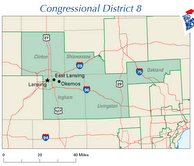He said Russia and Venezuela could be conducting joint naval exercises. He also said Venezuela is planning to purchase submarines, Russia has new missiles that can reach the U.S., and Saudi Arabia is spending $3 billion on new Islamic schools in Indonesia. (emphasis added)
[skip]
The most frustrating part, Rogers said, is some government regulations that prohibit the country from moving quicker. As an example, he said one company has spent $3 billion over 10 years trying to build a new refinery in Arizona. He said the country needs more refineries, and they would in turn help lower gasoline prices.
"Enough is enough," he said. "Give us everything."
If the U.S. could tap into all of its potential oil reserves, Rogers said, the country could by 2015 generate all of its own oil and not buy a barrel from foreign countries.
Oh, where to begin?
Let's start with the fact that Mr. Rogers has been a member of Congress since 2000. What, exactly, has he been doing about these unpleasant government regulations? Can he identify them? I'm only asking because in 2005, the President of the National Petrochemical and Refiners Association gave this testimony at a Congressional hearing:
We would like to say refiners have overcome hurdles to add capacity in the last several years. Despite some comments that have been made here, refiners added in the United States 2 million barrels of capacity between 1995 and 2005, despite considerable hurdles. One of the hurdles was the low return on investment in the industry. Basically, a return on investment in refining was basically running about 51⁄2 percent; when the S&P industrials were averaging about 12 1⁄2 percent.
See, this is what's called a bidness decision, Mr. Rogers. Ain't much profit in building new refineries, and tighter supply means higher prices and bigger profits for the oil companies.
Moving right along, here are a few facts from the U.S. Energy Information Administration:
* Canada remained the largest exporter of total petroleum in July, exporting 2.383 million barrels per day to the United States, which is an increase from last month (2.359 thousand barrels per day).
* The United States produces 10% of the world’s petroleum and consumes 24%.
And an EIA analysis of domestic offshore drilling found that
access to the Pacific, Atlantic, and eastern Gulf regions would not have a significant impact on domestic crude oil and natural gas production or prices before 2030. Leasing would begin no sooner than 2012, and production would not be expected to start before 2017. (emphasis added)
Once again, Mr. Rogers' creative view of facts is only promoting his own agenda. Our country is in serious trouble, and a "representative" who wilfully ignores reality isn't what America needs.





No comments:
Post a Comment